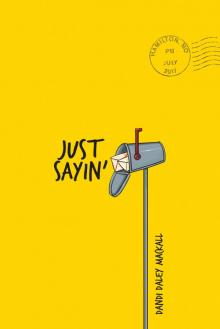- Home
- Dandi Daley Mackall
With Love, Wherever You Are
With Love, Wherever You Are Read online
Visit Tyndale online at www.tyndale.com.
Visit Dandi Daley Mackall’s website at www.dandibooks.com.
TYNDALE and Tyndale’s quill logo are registered trademarks of Tyndale House Publishers, Inc.
With Love, Wherever You Are
Copyright © 2017 by Dandi A. Mackall. All rights reserved.
Cover photograph of calligraphy copyright © arenadesign/Thinkstock. All rights reserved.
Cover illustration of frame copyright © Blan-k/Shutterstock. All rights reserved.
Cover photograph of field hospital copyright © Everett Historical/Shutterstock. All rights reserved.
Cover photograph of couple from the personal collection of the author, used with permission.
Unless otherwise noted, all photographs are from the personal collection of the author and are used with permission.
Cover designed by Gearbox
Interior designed by Dean H. Renninger
Edited by Sarah Mason Rische
Unless otherwise indicated, all Scripture quotations are taken from the Holy Bible, King James Version.
Epigraph taken from the Holy Bible, New Living Translation, copyright © 1996, 2004, 2015 by Tyndale House Foundation. Used by permission of Tyndale House Publishers, Inc., Carol Stream, Illinois 60188. All rights reserved.
With Love, Wherever You Are is a work of fiction. Where real people, events, establishments, organizations, or locales appear, they are used fictitiously. All other elements of the novel are drawn from the author’s imagination.
For information about special discounts for bulk purchases, please contact Tyndale House Publishers, Inc. at [email protected], or call 800-323-9400.
Library of Congress Cataloging-in-Publication Data
Names: Mackall, Dandi Daley, author.
Title: With love, wherever you are / Dandi Daley Mackall.
Description: Carol Stream, Illinois : Tyndale House Publishers, Inc., [2017]
Identifiers: LCCN 2016040796| ISBN 9781496421210 (hc) | ISBN 9781496421227 (sc)
Subjects: LCSH: World War, 1939-1945—Fiction. | GSAFD: Love stories. |
Christian fiction. | Historical fiction.
Classification: LCC PS3613.A27257 W58 2017 | DDC 813/.6—dc23 LC record available at https://urldefense.proofpoint.com/v2/url?u=https-3A__lccn.loc.gov_2016040796&d=DQIFAg&c=6BNjZEuL_DAs869UxGis0g&r=ZlF6A1J_SMm9xAyjgyDor34CB-fqQRaraBLNVSdnrVo&m=_um7EZC4G5GD3MzJo6HdDVZvxQb33kvvj_fk7sfEz6Y&s=fYZYb52YT85dV5i3H70EDscu-QgmVPiCL9LhDSOHVkI&e=
ISBN 978-1-4964-2125-8 (ePub); ISBN 978-1-4964-2124-1 (Kindle); ISBN 978-1-4964-2123-4 (Apple)
Build: 2016-12-14 19:47:34
For Mom and Dad, two of God’s best gifts
“My grace is all you need. My power works best in weakness.” So now I am glad to boast about my weaknesses, so that the power of Christ can work through me. That’s why I take pleasure in my weaknesses, and in the insults, hardships, persecutions, and troubles that I suffer for Christ. For when I am weak, then I am strong.
2 CORINTHIANS 12:9-10
Contents
Chapter 1: Helen
Chapter 2: Frank
Chapter 3: Helen
Chapter 4: Helen
Chapter 5: Frank
Chapter 6: Helen
Chapter 7: Frank
Chapter 8: Helen
Chapter 9: Frank
Chapter 10: Helen
Chapter 11: Helen
Chapter 12: Frank
Chapter 13: Frank
Chapter 14: Helen
Chapter 15: Helen
Chapter 16: Helen
Chapter 17: Frank
Chapter 18: Helen
Chapter 19: Frank
Chapter 20: Helen
Chapter 21: Frank
Chapter 22: Helen
Chapter 23: Frank
Chapter 24: Helen
Chapter 25: Frank
Chapter 26: Frank
Chapter 27: Frank
Chapter 28: Frank
Chapter 29: Helen
Chapter 30: Helen
Chapter 31: Helen
Chapter 32: Helen
Chapter 33: Helen
Chapter 34: Frank
Chapter 35: Helen
Chapter 36: Frank
Chapter 37: Helen
Chapter 38: Helen
Chapter 39: Helen
Chapter 40: Frank
Chapter 41: Helen
Chapter 42: Helen
Chapter 43: Helen
Chapter 44: Helen
Chapter 45: Frank
Chapter 46: Helen
Chapter 47: Frank
Chapter 48: Helen
Chapter 49: Frank
Chapter 50: Helen
Chapter 51: Frank
Chapter 52: Frank
Chapter 53: Helen
Chapter 54: Frank
Chapter 55: Frank
Chapter 56: Frank
Chapter 57: Helen
Chapter 58: Helen
Chapter 59: Helen
Chapter 60: Frank
Chapter 61: Helen and Frank
The Story behind the Story
Discussion Questions
Acknowledgments
About the Author
EVANSTON, ILLINOIS
DEC. 7, 1941
What now? Helen Eberhart elbowed her way through the mass of student nurses crowding the hospital bulletin board. If she were in charge, she would come up with a better system for assigning duties and shifts. Couldn’t this top-notch hospital afford more than one bulletin board, at the very least? Student nurses had to check several times a day, and heaven help the would-be nurse who missed one duty, one time change, one announcement.
She scanned the list until she got to her name. “Swell,” she muttered. Extra duties and extra hours. When was she supposed to study for her anatomy test?
She turned and stood on tiptoes to relay the bad news to her roommate. At five feet eight, half a foot taller than Helen, Lucille was easy to spot. “Lucille! Get coffee! We’ve both pulled extra—”
“Shhh! Shush, everybody!”
Helen wasn’t sure who’d said it, but the whole group quieted to a murmur. The PA system crackled and screeched—another thing she’d see to if she ever got to run things. Two white-jacketed interns strutting up the hall stopped and stared at the metal loudspeaker as if waiting for God—or the chief of staff—to issue at least ten commandments.
True, they didn’t get many announcements, but Helen didn’t have time to gawk at a disembodied voice. “Coming through!”
“Quiet!” Nurse Benchley frowned at her.
Helen didn’t appreciate being shut down. If Benchley weren’t one of her instructors, she wouldn’t get away with it either.
“. . . Hawaii from the air.”
She’d missed the announcement, but she caught enough to know this wasn’t a page from the chief of staff. The hospital was relaying a radio broadcast.
“Just a moment. . . . I’ll repeat that.”
The hallway froze, interns transformed into wax statues with identical stunned expressions. Old Dr. Laban, his glasses crooked as always, dropped his arms to his sides like broken twigs snapping from a tree trunk. His clipboard dangled from one hand. Everybody seemed to move farther away from Helen, although nobody had budged. Sound froze too, leaving an eerie silence decibels below hospital-zone quiet.
Only the voice from the loudspeaker filled the hall, filled the hospital, filled the world:
“President Roosevelt says the Japanese have attacked Pearl Harbor in Hawaii from the air. . . .”
Helen couldn’t hear any more because suddenly the silence became a buzz. She thought the buzz must be in her head, growing louder and loud
er, like locusts in Cissna Park on a summer’s night.
Then the space around her exploded in cries and questions fired at random, aimed at nobody. The chaos was so rampant that Helen would have believed it if someone told her a bomb had struck the hospital.
“Did they say bombs? Actual bombs dropped on us?”
“I can’t believe it!”
“Dear God in Heaven!”
“Where’s Pearl Harbor?”
“They’ll come here next. You’ll see. What do we do now?”
“Chicago will be a target for sure.”
“I want to go home!”
“Jimmy’s in the July draft. What if they send him over there?”
“So we’re at war? I mean officially at war?”
“I always thought it would be the Germans. Why Japan?”
The questions bounced off Helen. She wouldn’t let them in. Not yet. Not when she was so close to becoming a real nurse. War would ruin everything. Besides, as long as she could remember, there had been wars somewhere, or people talking about them.
Her war had been to make a tin of corn bread stretch for a family of thirteen during the worst days of the Depression. Her battles had been standing up to big brothers who weren’t so sure she belonged in their family and to a father who said her place was on the farm, not learning how to take care of sick strangers in Chicago.
“Helen? Did you hear me?” Lucille shouted above the cacophony of voices that echoed in the halls. She elbowed her way to Helen’s side. “Come on. They’re showing us where the bomb shelters are.”
The crowd of nurses and doctors and patients flowed like floodwaters down the hall toward the stairwell. Lucille got pulled in with them, but not Helen. She shoved in the opposite direction, a lone fish swimming upstream.
“Hey! Where are you going, Eberhart?” Lucille shouted after her.
“Where do you think?” Helen called back. “I’ve got extra duty. I’ll be in room 301 if you need me!”
“Helen!”
“Nurse? This way.” An intern grabbed her arm and tried to spin her around and take her with him.
She jerked her arm away. Nothing was going to stop her. Not him. Not the Japanese. Not Roosevelt. Not the Germans.
She was going to graduate from nurse’s training. She had come here to live in a city where people danced to the big bands and wore furs like women on the covers of magazines. But most of all, she’d come to be a nurse, the best nurse Chicago had ever seen.
Helen Eberhart had known since she was nine years old what she’d do with her life. It had been a drizzly fall day when she’d hurried home after school, as usual, to do her chores.
“Look out, Gypsy!” Her brother Eugene rammed her from behind, nearly knocking her off her feet. They were both small for their age, but he was two years older, wiry and tough.
“You look out!” She didn’t mind being called Gypsy, not anymore. She’d never really believed her brothers when they told her gypsies left her on their doorstep when she was a baby.
“Race you home!” Eugene shouted, passing her on the left.
Helen hiked up her skirt and ran, following Eugene through the Weinigers’ lawn, over the flower beds, and up the street to home. But her brother the athlete pulled farther and farther ahead.
She was breathing hard by the time she reached home and spotted Eugene in the garden, standing by the roses. “Guess I win!” she shouted, heading for the back door, the official end of every race.
Eugene didn’t move. Helen thought he was shivering, but that was dumb. It was stove-hot outside. She called to him, but he didn’t answer.
“What’s the matter with you?” She plodded back to the garden, braced for one of his tricks. “Eugene? Why are you standing—?”
And that’s when she saw her mother. Ma was lying on the ground, one leg twisted under her, her hand still wrapped around cut roses. A dark pool spread around her, a growing red puddle shaping the dirt beneath her legs. From one leg, bright-red blood spurted like a fountain being shut off and on.
“Ma!” Helen dropped to her knees and held her mother’s head in her lap. Mom’s lips moved, but nothing came out. Her mother’s kind brown eyes twitched. There was too much white in them.
Helen shouted, “Call Dr. Roberts!” Eugene didn’t move. His cheeks were wet from crying. “Eugene, go call the doctor!”
He dropped to his knees.
Helen set down her mother’s head and barked orders at her brother. “You wait with her, hear?” She didn’t stick around for an answer but tore into the house, up half a flight of stairs to the kitchen. She cranked the phone on the wall and screamed into it, “Get me Dr. Roberts! Fast!”
“’Lo?” came Doc’s slow, deep voice. “Dr. Roberts here.”
“Dr. Roberts, this is Helen Eberhart. You have to come. Quick!”
“Which one is it? What’s the matter?”
“It’s Ma, Doc! She’s bleeding. Her leg. She’s in the garden and—”
“You listen to me now, Helen. I’m coming right over. Can you see the wound still bleeding?”
“It’s spurting up. There’s so much blood.” She wouldn’t cry. She couldn’t cry.
“It’s her veins. And we need to stop that bleeding before I get there. Is Ed home? Or the twins?”
“There’s just me.” She couldn’t count on Eugene.
“All right then,” he said, like he’d just then decided something. “You’ll have to do. I want you to get a dime and take it to where that blood’s spurting.”
Helen knew he wanted her to say something. But her heart was pounding too hard in her ears.
“Helen, can you do this? I know you won’t like the blood, honey.”
“It’s not that. Where am I going to find a dime?”
“You find it. That’s all. I need you to press a dime to your mother’s leg where it’s bleeding. A penny won’t do. Too thick. You get a dime, and you press it hard. Now go!”
She heard the phone click and dropped the receiver. It slapped against the wall.
A dime. A dime? You didn’t find change in this house. Not under cushions. Not sitting on tables. Dear Gott im Himmel, where on earth am I going to—?
Then she remembered. The jingle in her dad’s coat pocket, his Sunday coat. She could almost hear it, like the angels in heaven ringing their bells.
Helen tore into her parents’ room, where she was only allowed when it was her turn to dust. There was the coat hanging over the back of the door. She had to stand on tiptoes to reach the pocket. Please, God!
She felt something. “Got it!” She drew out three pennies and a dime. Clutching the dime in her scrawny fingers, she raced back to the garden. “I’m coming, Ma!” She slid to the ground, tearing her stockings on the rosebush. The blood. How could there be so much blood in one leg? The red fountain continued to spurt. Helen took the dime and forced it through the blood onto her mother’s leg. The coin slid against the red-drenched skin, but she pushed it hard, thumb on top of thumb. Blood oozed around the sides of the coin. Then it stopped.
“Ma, you’re going to be okay,” she whispered. “You’re not bleeding now. Dr. Roberts is on his way.”
Her mother twitched. Her dress was blood-soaked. Ma only had two dresses: this one and the one for Sundays. Her eyes rolled back, and her lips fluttered like moth wings. Helen imagined prayers coming from those lips, secret pleas and exchanges with God that her mother would never reveal.
Helen’s fingers pushed hard against the dime. Blood and sweat made the coin slippery, but she kept it over the hole. She pressed so hard that her fingers began to ache. Her mother’s red hair had come unpinned, and strands, redder still from the blood, clung to her cheek. Helen wanted to cradle Ma’s head in her lap, to smooth the hair off her face, the way Ma had done for her when she had the fever.
But she couldn’t let go of the dime.
“Eugene, help me hold this on her leg. I can’t do it any longer.”
Eugene didn’t move. He stayed k
neeling in the dirt, his fists rammed to his mouth.
Furious, Helen started to scream at him. Then she saw his eyes, wide with a terror that made his whole body shake. She took a deep breath, filled with the scent of roses, peonies, mums . . . and blood. “She’ll be okay, Eugene. I promise, Genie. She will.”
Her brother crept closer, then stopped. “I can’t do it,” he whispered.
And he couldn’t. She knew that the same way she’d known that dime would be in Dad’s coat pocket. The same way she knew she could keep the pressure on as long as she had to. “It’s okay. Go out to the road and flag down Doc Roberts.”
He took off at a run. Helen pressed on the dime, not letting it slip a hair to either side. The hole wasn’t bleeding anymore, but she wasn’t about to stop. Helen loved her mother, and Ma loved her. She knew that without it ever being said. She also knew that every one of the kids believed their mother loved him or her best.
What kind of talent, or love, was it that made everybody think you loved them best?
Helen’s thumbs went numb. Her nose itched. Her hands and arms ached. How long could it take for Doc to drive a mile and a half?
Finally, she heard the old Ford crawl up and Eugene scream, “He’s here, Helen! Doc! This way! She’s in the garden.” Doc and Eugene both came running.
Dr. Roberts squatted next to Helen, and still she was afraid to stop pressing down on the dime. “It’s okay,” he said. “You can let go now.”
She looked up at him. His hat was crooked. Sweat stained his shirt under his arms. “Are you sure?”
He placed his big, rough hands over hers, then tugged her fingers away from the wound. “See there? You stopped that bleeding all on your own, girl.”
It was true. Nothing came out of the pinprick hole in the large purple vein of the leg. Helen pulled down her mother’s dress and straightened her apron. “Will she be all right?”
Ma groaned and said something Helen couldn’t make out.
“I’m here, Mary.” Doc lifted Ma’s head and fingered one eyelid open, then the other. “You lie still now. Let me bandage that leg. We’re going to have to do something about those varicose veins of yours. I warned you this could happen. One prick, one bump, and that vein could open again.” He unbuckled his bag, took out a roll of bandages, and began wrapping the leg with the skill of Ma sewing school clothes.

 Just Sayin'
Just Sayin' Eager Star
Eager Star Gift Horse
Gift Horse Cowboy Colt
Cowboy Colt Natalie and the Bestest Friend Race
Natalie and the Bestest Friend Race Buckskin Bandit
Buckskin Bandit With Love, Wherever You Are
With Love, Wherever You Are Runaway
Runaway Horse Gentler in Training
Horse Gentler in Training Crazy in Love
Crazy in Love Dreams of a Dancing Horse
Dreams of a Dancing Horse The Silence of Murder
The Silence of Murder The Secrets of Tree Taylor
The Secrets of Tree Taylor Night Mare
Night Mare Natalie Wants a Puppy
Natalie Wants a Puppy Bold Beauty
Bold Beauty Larger-Than-Life Lara
Larger-Than-Life Lara My Boyfriends' Dogs
My Boyfriends' Dogs Dark Horse
Dark Horse Horse Dreams
Horse Dreams Friendly Foal
Friendly Foal Unhappy Appy
Unhappy Appy Mad Dog
Mad Dog A Horse's Best Friend
A Horse's Best Friend